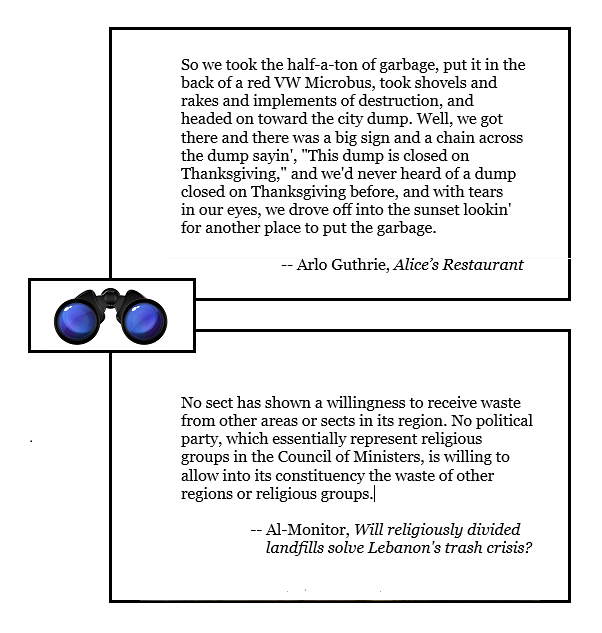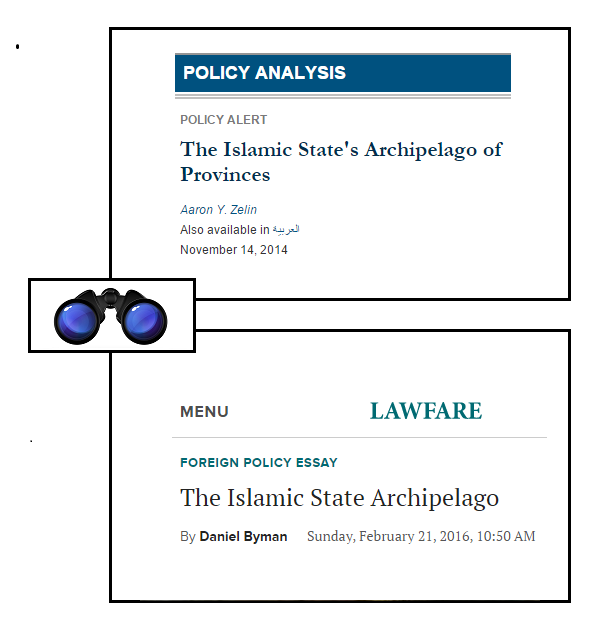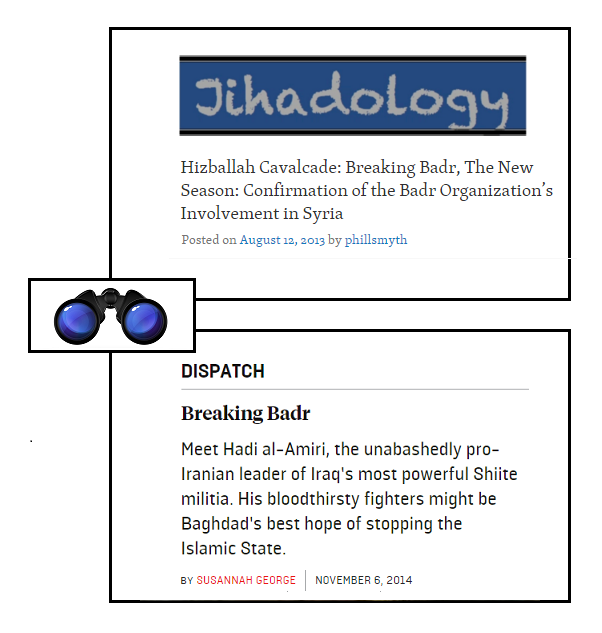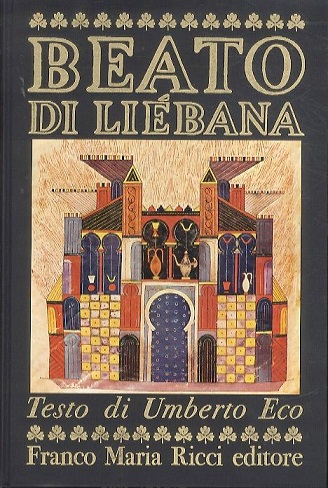Archive for February, 2016
Point counter point: Aaron Zelin & Phillip Smyth
Sunday, February 21st, 2016[ by Charles Cameron — a simple jeu d’esprit ]
.
It’s actually rather sweet, and possibly a matter of GMTA, but Aaron Zelin and Dan Byman both favor a word I’m fond of myself: archipelago.
**
Aaron noted the commonalities of topic and phrasing, and tweeted:
Imitation is the sincerest form of flattery pic.twitter.com/0xVzGm7cCg
— Aaron Y. Zelin (@azelin) February 21, 2016
to which Phillip Smyth responded:
@azelin Happens to the best of us…
That's why, post-coup, we go after editors first. 😉 pic.twitter.com/xuPDWP98eH— Phillip Smyth (@PhillipSmyth) February 21, 2016
**
Phillip’s example of imitation / flattery involves a pun on the name of the Prophet’s first battle, that of Badr:
**
Please note that there is absolutely nothing to be gained from these juxtapositions but sheer delight — there’s no “actionable intelligence” therein — yet two extremely sharp analysts nevertheless find them of sufficient interest to exchange tweets about them.
An eye for symmetries, similarities, parallelisms and oppositions will not always come up with useful correlations, but it’s nonetheless an aspect of mind that’s close to both creativity (see Arthur Koestler) and what bin Laden analyst Cindy Storer (in Manhunt) called “magic” —
not the analysts doing it, but other people who didn’t have that talent referred to it as magic.
**
Sources:
Aaron Zelin, The Islamic State’s Archipelago of Provinces Daniel Byman, The Islamic State Archipelago Phillip Smyth, Hizballah Cavalcade: Breaking Badr Suzannah George, Breaking Badr
The useful analysis is in the sources, and the useful description of analytic magic is currently easily accessible at the 9’14” point in HBO’s Manhunt on YouTube.
Umberto Eco, RIP
Saturday, February 20th, 2016[ by Charles Cameron — he was a man of word, wit and wisdom ]
.
The world was chastened last evening to learn of the passing from among us of Umberto Eco.
**
Zen has long admired Eco, as readers here will know, if for no other reason then as the original exponent of the concept of the antilibrary, here described by Nassim Nicholas Taleb in his book, The Black Swan:
The writer Umberto Eco belongs to that small class of scholars who are encyclopedic, insightful, and nondull. He is the owner of a large personal library (containing thirty thousand books), and separates visitors into two categories: those who react with “Wow! Signore professore dottore Eco, what a library you have! How many of these books have you read?” and the others — a very small minority — who get the point that a private library is not an ego-boosting appendage but a research tool. Read books are far less valuable than unread ones. The library should contain as much of what you do not know as your financial means, mortgage rates, and the currently tight real-estate market allows you to put there. You will accumulate more knowledge and more books as you grow older, and the growing number of unread books on the shelves will look at you menacingly. Indeed, the more you know, the larger the rows of unread books. Let us call this collection of unread books an antilibrary.
My own taste, as you know, runs to th apocalyptic, and I have long lusted for his sumptuous edition for Franco Maria Ricci of the Beatus of Liebana commentary on the Book of Revelation. I am grateful to discover I do have in my possession the second issue of FMR magazine, with Eco’s essay Waiting for the Millennium (pp 63-92) containing a number of the plates from that larger work.
It was blog-friend Laura Walker who alerted me to Eco’s passing, with the graceful comment:
He is the best ambassador of the Middle Ages – thought, aesthetics, philosophy, humor, humanity – it’s as if he sends his works from there..
Indeed. We lament his passing.
A fantastic “bribery, corruption & recursion” DoubleTweet
Friday, February 19th, 2016[ by Charles Cameron — bribery regarding bribery in Ukraine and Iraq, form & pattern recognition as analytic markers ]
.
You might think it would be difficut to cap this, from Ukraine, which I quoted recently:
#Ukraine busts a prosecutor who tried to pay a $10k bribe for job in anti-corruption bureau https://t.co/cALDTIPpz3 pic.twitter.com/aZfE8Q5EZK
— Christopher Miller (@ChristopherJM) February 17, 2016
but I believe this, from Iraq, just might do the trick:
Iraq anti-corruption chief: "Everybody is corrupt, from the top of society to the bottom. Everyone. Including me.” https://t.co/7arNBklYSE
— Borzou Daragahi (@borzou) February 19, 2016
**
Let me be explicit.
As an observer of the global scene, these two tweets are about bribery and corruption — but they are also recursive. As an analyst, I find that formal property, present in each case, compelling: these are not simply example of corruption, but of the corruption of the anti-corruption process.
But there’s more, there’s yet another form here, a pattern which allows us to connect otherwise unrelated dots. It is found in the doubling effect of the quick succession of the Ukrainean and Iraqi tweets. This pattern is that of repetition — more fancifully put, echo or rhyme. We see here something more than a simple isolated incident no matter how interesting — an being cognizant of that, we can be on the alert for it elsewhere in the future.
To the heuristics follow the money and cherchez la femme, I’d add take note of the form — use pattern recognition as an analytic tool to cut across disciplines and silos, and thus capture aspects of life’s complexity that the trammels of linear cause-and-effect thinking will tend to miss.
For the DoubleQuotes aficionado, these two tweets are a rich haul indeed.
New Book ! Global Radical Islamist Insurgency
Friday, February 19th, 2016[by Mark Safranski / “zen“]
Torn from the pages of Small Wars Journal…..

Global Radical Islamist Insurgency: al Qaeda and Islamic State Networks Focus Vol. II 2012-2014 edited by Dave Dilegge and Robert Bunker
New and looking to be very useful. Right up the alley for our own Charles Cameron and friends of ZP blog like Tim Furnish and Leah Farrell. Another one, Daveed Gartenstein-Ross has written the foreword.
From SWJ:
….This anthology-the second of an initial two volume set-specifically covers Small Wars Journal writings on Al Qaeda and the Islamic State spanning the years 2012-2014. This set is meant to contribute to U.S. security debates focusing on radical Islamist global insurgency by collecting diverse SWJ essays into more easily accessible formats. Small Wars Journal has long been a leader in insurgency and counterinsurgency research and scholarship with an emphasis on practical applications and policy outcomes in furtherance of U.S. global and allied nation strategic interests. The site is able to lay claim to supporting the writings of many COIN (counterinsurgency) practitioners. This includes Dr. David Kilcullen whose early work dating from late 2004 “Countering Global Insurgency” helped to lay much of the conceptual basis focusing on this threat and as a result greatly helped to facilitate the writings that were later incorporated into these Al Qaeda and Islamic State focused anthologies. This volume is composed of sixty-six chapters divided into sections on a) radical Islamist OPFORs (opposition forces) and context and b) U.S.-allied policy and counter radical Islamist strategies.
The editors are well known to many ZP readers with Dave being SWJ Editor-in-Chief while Dr. Bunker is the Futurist in Residence for the Strategic Studies Institute. Somewhere along the line though, I somehow completely missed the roll-out for Volume I. Guess my review copy was lost in the mail….cough 🙂 I will be ordering both.
In all seriousness, I’m very glad to see the valuable work done by the editors and contributors at SWJ compiled into book form. Small Wars Journal is literally a national resource of military thinking, theory and open debate that operates on a shoestring and love of country ( consider making a tax deductible donation here).






